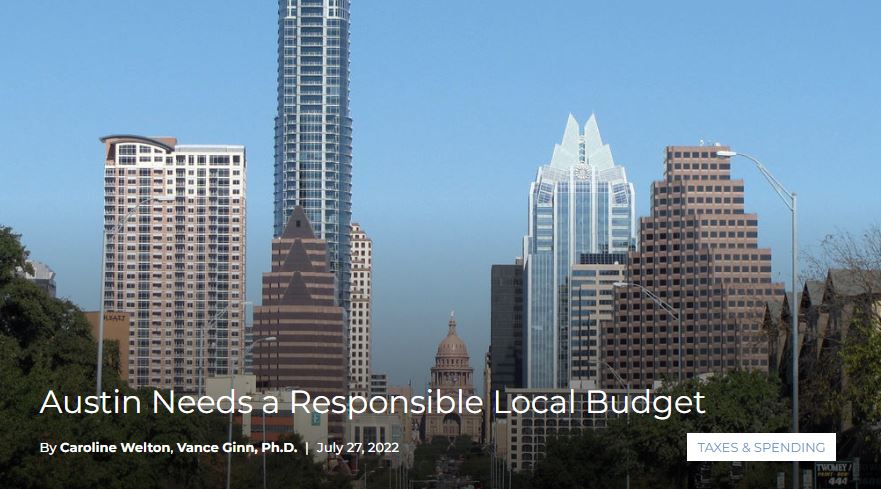|
On July 15, Austin City Manager Spencer Cronk laid out a proposed $5 billion city budget for fiscal year 2023. While introducing the mammoth 971-page document, Cronk said: “We are always mindful of our impact on the pocketbooks of Austinites. At the same time, we firmly believe that effective city government is critical to the success, financially and otherwise, of our whole community—and we will endeavor to continue to strike the right balance.”
But while balance may have been the intent, big government spending was the result. It’s time for a Responsible Austin Budget that puts taxpayers first. Under the guise of worker shortages and a perceived inability to meet core government services, such as law enforcement or emergency services, the budget focuses on increasing pay and benefits to city employees on the back of taxpayers. Specifically, it proposes increasing their minimum wage from $15 to $18 per hour and giving a $1,500 stipend for employees serving at least one year. It also creates at least 200 new positions, an interesting choice given the city’s difficulty retaining its current employees and its many vacancies. These increases, along with other priorities such as reducing greenhouse gas emissions and homelessness with large city-funded programs, come at a high, irresponsible cost. No government spending is “free,” as every dollar comes from taxpayers. Cronk presented the budget as a positive step after fears last year that economic strain would lead to drastic budget cuts and layoffs, and attributed this gain to the city’s fiscal management and economic recovery after COVID-19. However, much of the city’s fiscal position could well be attributed to the pro-growth policies at the state level and huge influx of federal aid, which could create big problems for taxpayers later, if not handled properly. Once one-time federal monies expire, officials will be tempted to maintain programs indefinitely through tax and fee increases. It doesn’t matter if it comes out of the left or right pocket, this excessive spending will put even greater pressure on Austin taxpayers. To be fair, the proposed budget does provide for a property tax rate reduction, moving the current rate from $0.541 to $0.4519 per valued $100 , a 16.5% cut. However, this is being done in large part to compensate for soaring real estate valuations and in order to stay under the newly-imposed 3.5% revenue limit, so depending on how much appraisals are up this could still be a tax hike. To counter the growth of taxes and spending, TPPF has proposed a Responsible Austin Budget. Over the last 10 years, the city of Austin has passed a budget that grew 14.3 percentage points faster than population growth plus inflation, increasing the cumulative cost of funding spending for an average family of four by more than $9,000. The FY 2023 RAB sets a maximum budget of $4.93 billion based on population growth plus inflation of 5.75% to help improve Austin’s affordability crisis in an already economically costly time. The proposed city of Austin budget exceeds this limit by $70 million, a staggering amount when you consider that prices at the gas pump and grocery store are by far the biggest concern of American adults today. The Federal Reserve raised its federal funds rate target today, creating more concern about the high cost of operating businesses, taking out loans, and maintaining essentials of everyday life. In all, given rising inflation and economic uncertainty from mostly the bad policies out of D.C., but also those from the city of Austin, local officials should be responsible in maintaining budget limits. Not generous in creating new positions and raising wages which will unduly burden taxpayers. The Austin City Council should amend the budget before final approval, maintaining a Responsible Austin Budget, instead of doing more harm by exceeding it. That will help Austinites weather this economic storm. Published at TPPF with Caroline Welton Comments are closed.
|
Vance Ginn, Ph.D.
|


 RSS Feed
RSS Feed